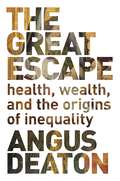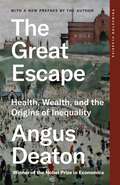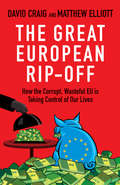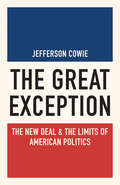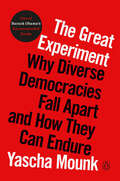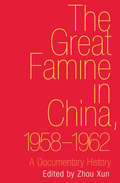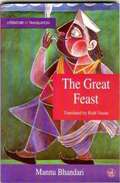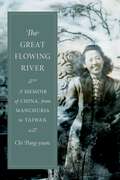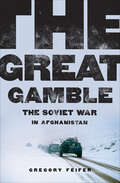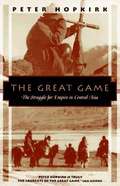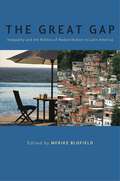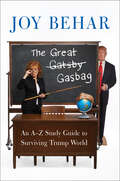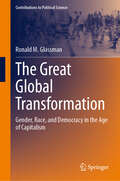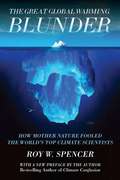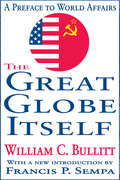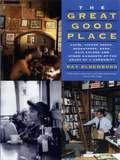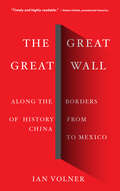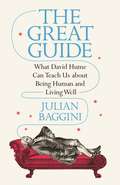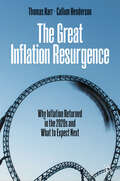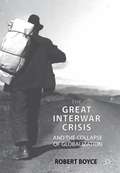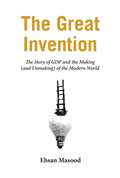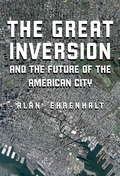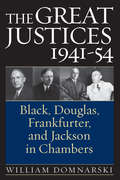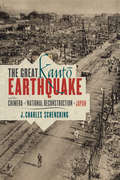- Table View
- List View
The Great Escape: Health, Wealth, and the Origins of Inequality
by Angus DeatonA Nobel Prize–winning economist tells the remarkable story of how the world has grown healthier, wealthier, but also more unequal over the past two and half centuriesThe world is a better place than it used to be. People are healthier, wealthier, and live longer. Yet the escapes from destitution by so many has left gaping inequalities between people and nations. In The Great Escape, Nobel Prize–winning economist Angus Deaton—one of the foremost experts on economic development and on poverty—tells the remarkable story of how, beginning 250 years ago, some parts of the world experienced sustained progress, opening up gaps and setting the stage for today's disproportionately unequal world. Deaton takes an in-depth look at the historical and ongoing patterns behind the health and wealth of nations, and addresses what needs to be done to help those left behind.Deaton describes vast innovations and wrenching setbacks: the successes of antibiotics, pest control, vaccinations, and clean water on the one hand, and disastrous famines and the HIV/AIDS epidemic on the other. He examines the United States, a nation that has prospered but is today experiencing slower growth and increasing inequality. He also considers how economic growth in India and China has improved the lives of more than a billion people. Deaton argues that international aid has been ineffective and even harmful. He suggests alternative efforts—including reforming incentives to drug companies and lifting trade restrictions—that will allow the developing world to bring about its own Great Escape.Demonstrating how changes in health and living standards have transformed our lives, The Great Escape is a powerful guide to addressing the well-being of all nations.
The Great Escape: Health, Wealth, and the Origins of Inequality (Princeton Classics #136)
by Angus DeatonA Nobel Prize–winning economist tells the remarkable story of how the world has grown healthier, wealthier, but also more unequal over the past two and half centuriesThe world is a better place than it used to be. People are healthier, wealthier, and live longer. Yet the escapes from destitution by so many has left gaping inequalities between people and nations. In The Great Escape, Nobel Prize–winning economist Angus Deaton—one of the foremost experts on economic development and on poverty—tells the remarkable story of how, beginning 250 years ago, some parts of the world experienced sustained progress, opening up gaps and setting the stage for today's disproportionately unequal world. Deaton takes an in-depth look at the historical and ongoing patterns behind the health and wealth of nations, and addresses what needs to be done to help those left behind.Deaton describes vast innovations and wrenching setbacks: the successes of antibiotics, pest control, vaccinations, and clean water on the one hand, and disastrous famines and the HIV/AIDS epidemic on the other. He examines the United States, a nation that has prospered but is today experiencing slower growth and increasing inequality. He also considers how economic growth in India and China has improved the lives of more than a billion people. Deaton argues that international aid has been ineffective and even harmful. He suggests alternative efforts—including reforming incentives to drug companies and lifting trade restrictions—that will allow the developing world to bring about its own Great Escape.Demonstrating how changes in health and living standards have transformed our lives, The Great Escape is a powerful guide to addressing the well-being of all nations.
The Great European Rip-off: How the Corrupt, Wasteful EU is Taking Control of Our Lives
by Dr David Craig Matthew ElliottIn this EU referendum year, it's time for people across Europe to look at what really goes on in Brussels in our name. It has been estimated that the EU costs us around £1,000 billion a year - an incredible £2000 for every man, woman and child in Europe. So what do we get for our money? Politicians and administrators selflessly working to bring us efficient government? Well-targeted regulations that promote economic prosperity? A safe and free society? A well-protected environment? Help for people in poorer countries? Or is our money being squandered by a self-serving euro-elite of unaccountable politicians and incompetent bureaucrats, or else devoured in a feeding frenzy of fraud and corruption where a few lucky insiders become unimaginably rich at our expense? And is the tsunami of regulation pouring out of Brussels in reality strangling industry, destroying jobs, restricting personal freedom, desecrating the environment and further impoverishing the developing world?Using their extensive network of insider sources, David Craig and Matthew Elliott smash through the secrecy and disinformation that are the Brussels hallmark to reveal what our European rulers are really getting up to. The result is a horrifying story of bureaucracy, hypocrisy and kleptocracy - and how we are all suffering as a result.
The Great Exception
by Jefferson CowieThe New Deal: where does it fit in the big picture of American history? What does it mean for us today? What happened to the economic equality it once engendered? In The Great Exception, Jefferson Cowie provides new answers to these big questions. Beginning in the Great Depression and through to the 1970s, he argues, the United States built a uniquely equitable period that contrasts with the deeper historical patterns of American political practice, economic structure, and cultural outlook. During those exceptional decades, which Cowie situates in the long arc of American history, the government used its considerable resources on behalf of working Americans in ways that it had not before and has not since. The crises of the Depression and World War II forced realignments of American politics and class relations, but these changes were less a permanent triumph of the welfare state than the product of a temporary cessation of enduring tensions involving race, immigration, culture, class, and individualism. Against this backdrop, Cowie shows how any renewed American battle for collective economic rights needs to build on an understanding of how the New Deal was won--and how it ultimately succumbed to contrasting patterns ingrained in U.S. history. As positive as the era of Roosevelt was in creating a more equitable society, Cowie suggests that the New Deal may necessarily belong more to the past than the future of American politics. Anyone who wants to come to terms with the politics of inequality in U.S. history will need to read The Great Exception. Some images inside the book are unavailable due to digital copyright restrictions.
The Great Experiment: Why Diverse Democracies Fall Apart and How They Can Endure
by Yascha MounkFrom one of our sharpest and most important political thinkers, a brilliant big-picture vision of the greatest challenge of our time—how to bridge the bitter divides within diverse democracies enough for them to remain stable and functionalSome democracies are highly homogeneous. Others have long maintained a brutal racial or religious hierarchy, with some groups dominating and exploiting others. Never in history has a democracy succeeded in being both diverse and equal, treating members of many different ethnic or religious groups fairly. And yet achieving that goal is now central to the democratic project in countries around the world. It is, Yascha Mounk argues, the greatest experiment of our time. Drawing on history, social psychology, and comparative politics, Mounk examines how diverse societies have long suffered from the ills of domination, fragmentation, or structured anarchy. So it is hardly surprising that most people are now deeply pessimistic that different groups might be able to integrate in harmony, celebrating their differences without essentializing them. But Mounk shows us that the past can offer crucial insights for how to do better in the future. There is real reason for hope. It is up to us and the institutions we build whether different groups will come to see each other as enemies or friends, as strangers or compatriots. To make diverse democracies endure, and even thrive, we need to create a world in which our ascriptive identities come to matter less—not because we ignore the injustices that still characterize the United States and so many other countries around the world, but because we have succeeded in addressing them. The Great Experiment is that rare book that offers both a profound understanding of an urgent problem and genuine hope for our human capacity to solve it. As Mounk contends, giving up on the prospects of building fair and thriving diverse democracies is simply not an option—and that is why we must strive to realize a more ambitious vision for the future of our societies.
The Great Famine in China, 1958-1962: A Documentary History
by Zhou XunBeginning soon after the implementation of the policies of the Great Leap Forward of 1958-1961, when the drive to collectivize and industrialize undermined the livelihoods of the vast majority of peasant workers, China’s Great Famine was the worst famine in human history. In addition to claiming more than 45 million lives, it also led to the destruction of agriculture, industry, trade, and every aspect of human life, leaving large parts of the Chinese countryside scarred forever by human-created environmental disasters. Drawing on previously closed archives that have since been made inaccessible again, Zhou Xun offers readers, for the first time in English, access to the most vital archival documentation of the famine. For some time to come this documentary history may be the only publication available that contains the most crucial primary documents concerning the fate of the Chinese peasantry between 1957 and 1962. It covers everything from collectivization and survival strategies, including cannibalism, to selective killing and mass murder.
The Great Feast
by Mannu Bhandari Ruth Vanita'Caste' plays a pivotal role in the lives of people and politics, becoming hand in glove to sustain the unethical treatment meted out to common civilians.
The Great Flowing River: A Memoir of China, from Manchuria to Taiwan
by Chi Pang-yuanHeralded as a literary masterpiece and a best-seller in the Chinese-speaking world, The Great Flowing River is a personal account of the history of modern China and Taiwan unlike any other. In this eloquent autobiography, the noted scholar, writer, and teacher Chi Pang-yuan recounts her youth in mainland China and adulthood in Taiwan. Chi’s remarkable life, told in rich and striking detail, humanizes the eventful and turbulent times in which she lived.The Great Flowing River begins as a coming-of-age story set against the backdrop of China’s war with Japan. Chi depicts her childhood in pre-occupation Manchuria and gives an eyewitness account of life in China during the war with Japan. She tells the tale of her youthful romance with a dashing pilot that ends tragically when he is shot down in the last days of the war. The book describes the deepening political divide in China and her choice to take a job in Taiwan, where she would remain after the Communist victory. Chi details her growth as an educator, scholar, and promoter of Chinese literature in translation and her realization that despite her roots in China, she has found a home in Taiwan, giving an immersive account of the postwar history of Taiwan from a mainlander’s perspective. A novelistic, epoch-defining narrative, The Great Flowing River unites the personal and intimate with the grand sweep of history.
The Great Gamble: The Soviet War in Afghanistan
by Gregory FeiferAn account of the USSR’s defeat in Afghanistan drawing on many interviews with Soviet veterans: “Fascinating. . . . A highly readable history of the conflict.” —The New York Times Book ReviewIn this groundbreaking account of the Soviet invasion of Afghanistan, former NPR Moscow correspondent Gregory Feifer vividly depicts the war that contributed greatly to the demise of the USSR, and that offers striking lessons for the twenty-first century as well. Told primarily from the perspective of the Russians who fought it, The Great Gamble offers valuable insight into the history of Afghanistan’s troubled government and the rise of the mujahideen and Al-Qaeda. “Feifer has done truly extraordinary research . . . For all its heft, [The Great Gamble] is an effortless read—an unusual and gratifying combination.” —Minneapolis Star Tribune“A provocative and important book, telling us what the Soviet military was thinking and feeling as it lost its war in Afghanistan. Gregory Feifer vividly shows that their campaigns there amounted to a manual of how not to do it.” —Thomas Ricks, author of Fiasco“Thoughtful, deliberative use of eyewitness testimony gives an intensely close-up sense of what the war was like for those who fought it.” —Kirkus Reviews“Brings to life in spirited detail the bloody, eight-year struggle that killed a million Afghans and tens of thousands of Russians and broke the back of the Soviet Union, which disappeared within two years of the war’s end. You think it can’t happen to us? Read Feifer.” —Thomas Powers, Pulitzer Prize-winner and author of Heisenberg’s War
The Great Game: The Struggle for Empire in Central Asia
by Peter HopkirkThis book, Peter Hopkirk's spellbinding account of the great imperial struggle for supremacy in Central Asia, is an essential reading with that era's legacy playing itself out today. In this gripping narrative he recounts a breathtaking tale of espionage and treachery through the actual experiences of its colorful characters.
The Great Gap: Inequality and the Politics of Redistribution in Latin America
by Edited by Merike BlofieldThe relationship between socioeconomic inequality and democratic politics has been one of the central questions in the social sciences from Aristotle on. Recent waves of democratization, combined with deepened global inequalities, have made understanding this relationship ever more crucial. In The Great Gap, Merike Blofield seeks to contribute to this understanding by analyzing inequality and politics in the region with the highest socioeconomic inequalities in the world: Latin America. The chapters, written by prominent scholars in their fields, address the socioeconomic context and inequality of opportunities; elite culture, public opinion, and media framing; capital mobility, campaign financing, representation, and gender equality policies; and taxation and social policies.Aside from the editor, the contributors are Pablo Alegre, Maurício Bugarin, Daniela Campello, Anna Crespo, Francisco H. G. Ferreira, Fernando Filgueira, Liesl Haas, Sallie Hughes, Juan Pablo Luna, James E. Mahon Jr., Juliana Martínez Franzoni, Adriana Cuoco Portugal, Paola Prado, Elisa P. Reis, Luis Reygadas, Sergio Naruhiko Sakurai, and Koen Voorend.
The Great Gap: Inequality and the Politics of Redistribution in Latin America
by Merike BlofieldThe relationship between socioeconomic inequality and democratic politics has been one of the central questions in the social sciences from Aristotle on. Recent waves of democratization, combined with deepened global inequalities, have made understanding this relationship ever more crucial. In The Great Gap, Merike Blofield seeks to contribute to this understanding by analyzing inequality and politics in the region with the highest socioeconomic inequalities in the world: Latin America. The chapters, written by prominent scholars in their fields, address the socioeconomic context and inequality of opportunities; elite culture, public opinion, and media framing; capital mobility, campaign financing, representation, and gender equality policies; and taxation and social policies.Aside from the editor, the contributors are Pablo Alegre, Maurício Bugarin, Daniela Campello, Anna Crespo, Francisco H. G. Ferreira, Fernando Filgueira, Liesl Haas, Sallie Hughes, Juan Pablo Luna, James E. Mahon Jr., Juliana Martínez Franzoni, Adriana Cuoco Portugal, Paola Prado, Elisa P. Reis, Luis Reygadas, Sergio Naruhiko Sakurai, and Koen Voorend.
The Great Gasbag: An A–Z Study Guide to Surviving Trump World
by Joy BeharThe beloved stand-up comedian and co-host of ABC’s The View presents a hilarious alphabetical guide to all things wrong with Donald Trump.Put down the Valium, get out of bed: Joy Behar is here to save you from self-harm as she hot-walks you through the Trump presidency. On her hit ABC daytime show The View, Joy has been blunt in her condemnation of the comb-over-in-chief, and her words have electrified and inspired millions in the resistance for whom #notmypresident has become a rallying cry. So putting aside despair, Joy’s response is one that will cheer the hearts of Never Trumpers everywhere, because the only sane response to the insanity in the White House is laughter.The Great Gasbag is Joy’s answer to the hell that is the Trump Orange House. Structured as an A–Z guide (A is for Alternative Facts; B is for Bigly; C is for Conman, etc.), this book offers much-needed doses of levity for everyone determined to #resist. Taking on the bloviated bumpkin from every conceivable angle, Joy puts Trump in his gold-plated place, making us laugh as she dissects the worst president since ever.Funny, caustic, and a call to arms for anyone who’s had enough of living in Trumpland, The Great Gasbag is the only study guide you’ll ever need to survive Donald and his world.
The Great Global Transformation: Gender, Race, and Democracy in the Age of Capitalism (Contributions to Political Science)
by Ronald M. GlassmanThis book explores Karl Polanyi's concept of labor, land, and money as "fictional commodities" created by the market. Capitalism transformed these elements, shifting labor from artisanal crafts to factory wage work, land from communal ownership to private property, and money from a medium of exchange to capital for profit. The book extends Polanyi's vision to modern transformations, analyzing the impact of automation, Artificial Intelligence, and technological advancements on society. It examines the great changes in gender, sexuality, race, and religion, highlighting the ongoing evolution of social and cultural norms. Additionally, the book analyzes the complex relationship between free market capitalism and democracy, offering insights into the balance of power and the future of democratic governance in a rapidly changing world. This book critically analyzes the forces shaping contemporary society. It will appeal to students, scholars, and researchers in political science, economics, and the social sciences, interested in a better understanding of the great global transformation.
The Great Global Warming Blunder
by Roy W SpencerThe Great Global Warming Blunder unveils new evidence from major scientific findings that explode the conventional wisdom on climate change and reshape the global warming debate as we know it. Roy W. Spencer, a former senior NASA climatologist, reveals how climate researchers have mistaken cause and effect when analyzing cloud behavior and have been duped by Mother Nature into believing the Earth's climate system is far more sensitive to human activities and carbon dioxide than it really is.In fact, Spencer presents astonishing new evidence that recent warming is not the fault of humans, but the result of chaotic, internal natural cycles that have been causing periods of warming and cooling for millennia. More carbon dioxide in the atmosphere is not necessarily to be feared; The Great Global Warming Blunder explains that burning of fossil fuels may actually be beneficial for life on Earth.As group-think behavior and misguided global warming policy proposals threaten the lives of millions of the world's poorest, most vulnerable citizens, The Great Global Warming Blunder is a scintillating exposé and much-needed call for debate.
The Great Globe Itself: A Preface to World Affairs
by Arthur Asa BergerIn 1946, William Bullitt, the first U.S. Ambassador to the Soviet Union, U.S. Ambassador to France at the outbreak of the Second World War, and onetime close advisor to FDR, wrote the first book-length, comprehensive analysis of the emerging Cold War between the United States and the Soviet Union. During the war, as the book's new introduction by Francis P. Sempa points out, Bullitt had repeatedly urged President Roosevelt to wage war with a view toward the postwar balance of power. Bullitt recounted in this volume how the United States missed opportunities to block Soviet geopolitical gains during the war due to a fundamental misreading of the nature of the Soviet political system.Bullitt wrote The Great Globe Itself from the perspective of a key advisor to President Roosevelt who evolved into a strident critic of the president's wartime diplomacy toward the Soviet Union. When Soviet Russia became a wartime ally of the United States, Bullitt understood that the alliance would last only until the common enemy (Hitler's Germany) was defeated.Bullitt's discussion and analysis of fundamental global geopolitical realities and his prudent counsel to couple diplomacy with force in international relations are as relevant today as when he wrote the book, nearly sixty years ago.
The Great Good Place: Cafes, Coffee Shops, Bookstores, Bars, Hair Salons, and Other Hangouts at the Heart of a Community
by Ray OldenburgThe Great Good Place argues that third places - where people can gather, put aside the concerns of work and home, and hang out simply for the pleasures of good company and lively conversation - are the heart of a community's social vitality and the grassroots of democracy.
The Great Great Wall: Along the Borders of History from China to Mexico
by Ian Volner“Timely and highly readable . . . provides a valuable backdrop to Donald Trump’s insistence on a barrier across America’s southern border.” —Robert Dallek, presidential historianDuring his campaign for the presidency, one of Donald Trump’s signature promises was that he would build a “great great wall” on the border between the US and Mexico, and Mexico was going to pay for it. Now, with only a few prototype segments erected, the wall is the 2,000-mile, multibillion-dollar elephant in the room of contemporary American life.In The Great Great Wall, architectural historian and critic Ian Volner takes a fascinating look at the barriers that we have built over millennia. Traveling far afield, to China, the Middle East, Europe, and along the U.S. Mexico border, Volner examines famous, contentious, and illuminating structures, and explores key questions: Why do we build walls? What do they reveal about human history? What happens after they go up? With special attention to Trump’s wall and the walls that exist along the US border already, this is an absorbing, smart, and timely book on an incredibly contentious and newsworthy topic.“A work of literary alchemy that transmutes the wall, a simple architectural structure, and of late, political metaphor, into a prism through which to view the panorama of human history . . . this book will amaze, delight, and enchant even the most jaded nonfiction aficionado.” —William J. Bernstein, award-winning author of The Delusions of Crowds“A global journey to some of history’s most significant walls—China, Berlin, and even Jericho—weaving together a fascinating account of their foundational myths and current realities.” —Carrie Gibson, author of El Norte
The Great Guide: What David Hume Can Teach Us about Being Human and Living Well
by Julian BagginiInvaluable wisdom on living a good life from one of the Enlightenment's greatest philosophersDavid Hume (1711–1776) is perhaps best known for his ideas about cause and effect and his criticisms of religion, but he is rarely thought of as a philosopher with practical wisdom to offer. Yet Hume's philosophy is grounded in an honest assessment of nature—human nature in particular. The Great Guide is an engaging and eye-opening account of how Hume's thought should serve as the basis for a complete approach to life.In this enthralling book, Julian Baggini masterfully interweaves biography with intellectual history and philosophy to give us a complete vision of Hume's guide to life. He follows Hume on his life's journey, literally walking in the great philosopher's footsteps as Baggini takes readers to the places that inspired Hume the most, from his family estate near the Scottish border to Paris, where, as an older man, he was warmly embraced by French society. Baggini shows how Hume put his philosophy into practice in a life that blended reason and passion, study and leisure, and relaxation and enjoyment.The Great Guide includes 145 Humean maxims for living well, on topics ranging from the meaning of success and the value of travel to friendship, facing death, identity, and the importance of leisure. This book shows how life is far richer with Hume as your guide.
The Great Inflation Resurgence: Why Inflation Returned in the 2020s and What to Expect Next
by Callum Henderson Thomas HarrThis book explores why inflation surged globally in the 2020s, where we are heading and what lessons we can draw from it. Following a decade of too-low inflation, inflation suddenly surged in 2021–22 to its highest levels in 40 years in the US and Europe. The book introduces a simple economic framework and adopts a global perspective to compare the inflation experiences across the US, Europe, and Asia. Among the key questions the authors tackle is 1) why the West suddenly experienced surging inflation when their central banks had been fighting too-low inflation in the 2010s, 2) why so few economists saw the inflation resurgence coming, and 3) why China now faces deflation. The great inflation resurgence has taught us several key lessons, namely that inflation is a global phenomenon with local characteristics, that economists should rely more on broad economic thinking, and less on models when large shocks occur, and finally that fiscal policy is a major differentiator. The authors, a central banker and an economist on the ‘buy side’, offer key lessons for both central banks and financial markets while anticipating where inflation might be headed.
The Great Interwar Crisis and the Collapse of Globalization
by Robert BoyceChallenging the standard narrative of Interwar International History, this account establishes the causal relationship between the global political and economic crises of the period, and offers a radically new look at the role of ideology, racism and the leading liberal powers in the events between the First and Second World Wars.
The Great Invention: The Story of GDP and the Making and Unmaking of the Modern World
by Ehsan MasoodThe fascinating story of one of the twentieth-century's most influential and dangerously addictive ideas, told through the lives of those who invented it. The world's principal measure of the health of economies is gross domestic product, or GDP: the sum of what all of us spend every day, from the contents of our weekly shopping to large capital spending by businesses. GDP also includes the myriad things that our governments pay for, from libraries and road-line painting to naval dockyards and nuclear weapons. The Great Invention reveals how in just a few decades GDP became the world's most powerful formula: how six algebraic symbols forged in the fires of the 1930's economic crisis helped Europe and America prosper, how the remedy now risks killing the patient it once saved, and how this fundamentally flawed metric is creating the illusion of global prosperity--and why many world leaders want to be able to ignore it but so far remain powerless to do so. Drawing on interviews, firsthand accounts, and previously neglected source materials, The Great Invention takes readers on a journey from Capitol Hill to Whitehall--on the trail of theories made in Cambridge, tested in Karachi, and designed for global application--into the minds of unworldly geniuses seduced by the allure of power and the demands of politics.
The Great Inversion and the Future of the American City
by Alan EhrenhaltIn The Great Inversion and the Future of the American City we travel the nation with Alan Ehrenhalt, one of our leading urbanists, as he explains how America's cities are changing, what makes them succeed or fail, and what this means for our future. Just a couple of decades ago, we took it for granted that inner cities were the preserve of immigrants and the poor, and that suburbs were the chosen destination of those who could afford them. Today, a demographic inversion is taking place: Central cities increasingly are where the affluent want to live, while suburbs are becoming home to poorer people and those who come to America from other parts of the world. Highly educated members of the emerging millennial generation are showing a decided preference for urban life and are being joined in many places by a new class of affluent retirees. Ehrenhalt shows us how the commercial canyons of lower Manhattan are becoming residential neighborhoods, and how mass transit has revitalized inner-city communities in Chicago and Brooklyn. He explains why car-dominated cities like Phoenix and Charlotte have sought to build twenty-first-century downtowns from scratch, while sprawling postwar suburbs are seeking to attract young people with their own form of urbanized experience. The Great Inversion is an eye-opening and thoroughly engaging look at our urban society and its future.From the Hardcover edition.
The Great Justices 1941-54
by William DomnarskiDomnarski is a practicing intellectual property attorney in California and the author of a previous book on the history and nature of federal court judicial opinions. In this text, the author compares four brilliant and diverse jurists of the Roosevelt-era Court--Hugo Black, William O. Douglas, Felix Frankfurter, and Robert Jackson--during the period from 1941 to 1954. The study explores the Court's evolving civil rights jurisprudence that was born in the period during which the four justices served together, considers the Court as an institution and its relation to the American public, and analyzes how four individual justices sharing core jurisprudential beliefs and ambitions before appointment would later divide into competing liberal and conservative factions. Annotation ©2006 Book News, Inc. , Portland, OR (booknews. com)
The Great Kantō Earthquake and the Chimera of National Reconstruction in Japan (Contemporary Asia in the World)
by J. Charles SchenckingIn September 1923, a magnitude 7.9 earthquake devastated eastern Japan, killing more than 120,000 people and leaving two million homeless. Using a rich array of source material, J. Charles Schencking tells for the first time the graphic tale of Tokyo's destruction and rebirth. In emotive prose, he documents how the citizens of Tokyo experienced this unprecedented calamity and explores the ways in which it rattled people's deep-seated anxieties about modernity. While explaining how and why the disaster compelled people to reflect on Japanese society, he also examines how reconstruction encouraged the capital's inhabitants to entertain new types of urbanism as they rebuilt their world.Some residents hoped that a grandiose metropolis, reflecting new values, would rise from the ashes of disaster-ravaged Tokyo. Many, however, desired a quick return of the city they once called home. Opportunistic elites advocated innovative state infrastructure to better manage the daily lives of Tokyo residents. Others focused on rejuvenating society—morally, economically, and spiritually—to combat the perceived degeneration of Japan. Schencking explores the inspiration behind these dreams and the extent to which they were realized. He investigates why Japanese citizens from all walks of life responded to overtures for renewal with varying degrees of acceptance, ambivalence, and resistance. His research not only sheds light on Japan's experience with and interpretation of the earthquake but challenges widespread assumptions that disasters unite stricken societies, creating a "blank slate" for radical transformation. National reconstruction in the wake of the Great Kanto Earthquake, Schencking demonstrates, proved to be illusive.
